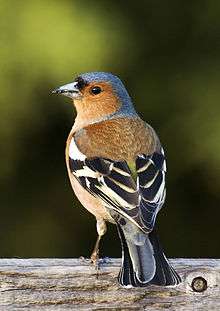fringilla
See also: Fringilla
Latin

fringilla (a chaffinch, but see entry)
Etymology
From Proto-Indo-European *bʰereg- (“to make a noise, growl, bark”), from *bʰer- (“to drone, hum, buzz”). Cognate with English bark, Latin frigūtiō (“I chirp”), Lithuanian burgė́ti (“to growl, grumble, grouch, quarrel”) and Serbo-Croatian brgljati (“to murmur”)[1].
Pronunciation
- (Classical) IPA(key): /frinˈɡil.la/, [frɪŋˈɡɪl.la]
Noun
fringilla f (genitive fringillae); first declension
Inflection
First declension.
| Case | Singular | Plural |
|---|---|---|
| Nominative | fringilla | fringillae |
| Genitive | fringillae | fringillārum |
| Dative | fringillae | fringillīs |
| Accusative | fringillam | fringillās |
| Ablative | fringillā | fringillīs |
| Vocative | fringilla | fringillae |
Related terms
Descendants
- Translingual: Fringilla
- Italian: fringuello
References
- fringilla in Charlton T. Lewis and Charles Short (1879) A Latin Dictionary, Oxford: Clarendon Press
- fringilla in Gaffiot, Félix (1934) Dictionnaire Illustré Latin-Français, Hachette
- Pokorny, Julius (1959), “bhereg-”, in Indogermanisches etymologisches Wörterbuch [Indo-European Etymological Dictionary] (in German), volume I, Bern, München: Francke Verlag, pages 138-139
This article is issued from
Wiktionary.
The text is licensed under Creative
Commons - Attribution - Sharealike.
Additional terms may apply for the media files.